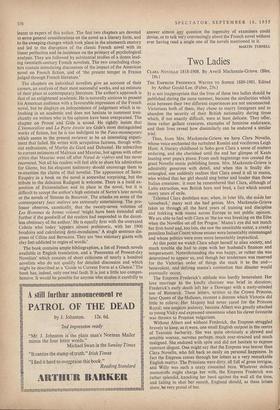Two Ladies
Jr is not inappropriate that the lives of these two ladies should be published during the same summer, because the similarities which exist between their two different experiences are not unconnected. Victorians both of them, they chose to marry foreigners and to abandon the security of their British nationality during times which, if not exactly difficult, were at least delicate. They offer, these rather gallant creatures, examples of feminine endurance, and their lives reveal how dissimilarly can be endured a similar trial. Thus, from Mrs. Mackenzie-Grieve we have Clara Novello, whose voice enchanted the turbulent Rossini and vociferous Leigh Hunt. A literary childhood in Soho gave Clara a sense of matters enduring, and she cherished until the end her glimpse of Keats leaning over papa's piano. From such beginnings was created the great Novello music publishing house. Mrs. Mackenzie-Grieve is admirably generous with detail, and when this is finally dis- entangled, one suddenly realises that Clara owed it all to mama, who wished that her girl should sing better and louder than those Italian creatures: it must be remembered that Clara, although of Latin extraction, was British born and bred, a fact which soured many years of exile. Talented Clara doubtless was; when, in later life, she made her 'comeback,' many said she had genius. Mrs. Mackenzie-Grieve takes us through all the hard years of training and discipline and trekking with mama across Europe to test public opinion. We are able to feel with Clara as 'the ice was breaking on the Elbe when the Novellos set off for Prague.' Mama's eye did not match her firm hand and, too late, she saw the unsuitable suitor, a cranky penniless Italian Count whose estates were lamentably mismanaged and whose politics were even more lamentably impractical. At this point we watch Clara adapt herself to alien society, and much trouble she had to cope with her husband's finances and temperament. Notwithstanding she was happy, or rather she was determined to appear so, and though her tenderness was reserved for the Victorian order of things she stuck it to the end— benevolent, and defying mama's contention that disaster would eventually occur. The Empress Frederick's attitude was hardly benevolent. Her love marriage to the kindly charmer was brief in duration; Frederick's early death left her a Dowager with a nasty-minded son of Bismarck. These letters, written to the Crown Princess, later Queen of the Hellenes, recount a distress which Victoria did little to relieve. Her Majesty had never cared for the Princess Royal; one suspects jealousy, because Albert was greatly attached to young Vicky and expressed uneasiness when his clever favourite was thrown to Prussian vulgarians. Without Albert and without Frederick, the Empress struggled bravely to keep, as it, were, one small English outpost in the centre of Teutonic barbarity. She was quite obviously a shrewd and sensible woman, nervous perhaps, much over-strained and much maligned. She endured with spite and did not hesitate to express constant disgust. One might say that the Empress was braver than Clara Novello, who fell back so easily on personal happiness. In fact the Empress comes through her letters as a very remarkable English martyr. The Prussians were dirty, all full of gross intrigue, and Willy was such a crazy conceited bore. Whatever defects memoirists might charge her with, the Empress Frederick was rather splendid, knocking her head against the wall all the time, and failing to shut her mouth. England should, as these letters show, be very proud of her.
Victorian ladies both of them, Clara Novello and the Empress Frederick, exiled to endure in countries they despised. Who shall judge the one better than the other? The Empress wattled miser- ably for so long, and Clara's perpetual 'Oh! well, I've got Guiseppe' is not entirely recommendable.
KAY DICK



































 Previous page
Previous page